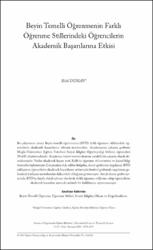Beyin temelli öğrenmenin farklı öğrenme stillerindeki öğrencilerin akademik başarılarına etkisi
Abstract
Bu çalışmanın amacı Beyin temelli öğrenmenin (BTÖ) farklı öğrenme stillerindeki öğrencilerin akademik başarılarına etkisini incelemektir. Araştırmanın çalışma grubunu Muğla Üniversitesi Eğitim Fakültesi Sosyal Bilgiler Öğretmenliği bölümü öğrencileri (N=68) oluşturmaktadır. Araştırma öntest-sontest deneme modelli bir çalışma olarak desenlenmiştir. Veriler akademik başarı testi, Kolb’ün öğrenme stil envanteri ve kişisel bilgi formuyla toplanmıştır. Çalışmadan elde edilen bulgular, deney grubunda uygulanan BTÖ yaklaşımın öğrencilerin akademik başarılarını arttırmada kontrol grubunda uygulanan geleneksel yaklaşım metodundan daha etkili olduğunu göstermiştir. Ancak deney grubu içerisinde BTÖ’ye dayalı olarak işlenen derslerde farklı öğrenme stillerine sahip öğrencilerin akademik başarıları arasında anlamlı bir farklılaşma saptanmamıştır. The purpose of the present study is to investigate the effects of Brain-based learning (BBL) on the academic achievement of students with different learning styles. The study group consists of students from the department of Social Sciences Teacher Education in the Faculty of Education at Mugla University (N=68). In the study, a pre-test-post-test experimental design was used. Data were collected by using academic achievement tests and the Kolb& #8217; s Experiential Learning Style questionnaire. The findings of the study revealed that the BBL approach used in the experimental group was more effective in increasing student achievement than the traditional approach used in the control group. However, no significant diff erence was observed among the achievement levels of the experimental group students with different learning styles.


















